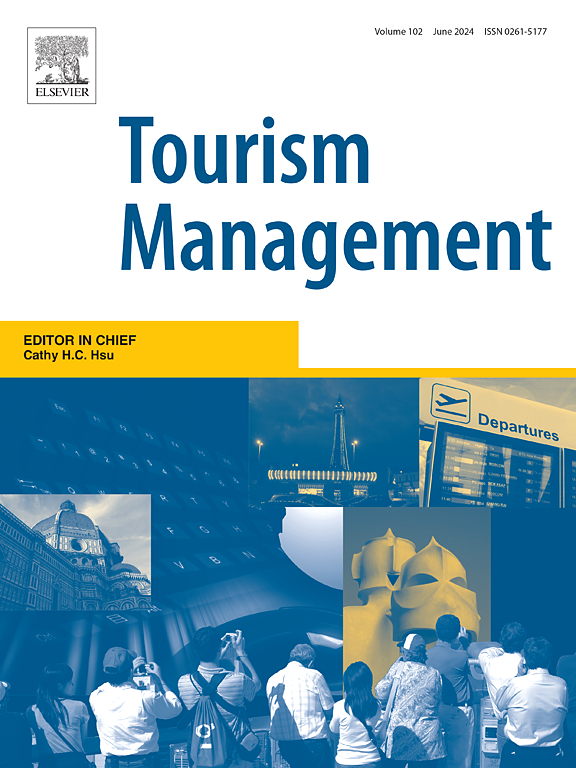通过旅行激发创造力:兴趣、认知灵活性和目的地信息呈现风格的作用
IF 12.4
1区 管理学
Q1 ENVIRONMENTAL STUDIES
引用次数: 0
摘要
尽管人们认为旅游和创造力之间存在联系,但研究仍然有限,结果也不一致。本研究利用特质激活理论和积极情绪的拓展-建构理论,提出了环境新颖性对游客创造力影响的理论模型。我们认为,环境的新奇唤起兴趣,培养认知灵活性和提高创造力。目的地信息(陈述或问题)的呈现方式影响认知刺激和创造力。我们通过实地准实验和四个基于场景的实验发现,新奇的环境通过兴趣和认知灵活性增强了创造力的灵活性维度,而不是原创性维度。此外,以提问的方式呈现信息会激发认知刺激,增加独创性。研究结果为寻求提高创造力的游客和开发新颖旅行体验的目的地管理组织提供了有价值的启示,这些体验将发人深省的问题纳入其信息展示。本文章由计算机程序翻译,如有差异,请以英文原文为准。
Igniting creativity through travel: The roles of interest, cognitive flexibility, and destination information presentation style
Despite the assumed link between tourism and creativity, research remains limited, and findings are inconsistent. This study draws on trait activation theory and broaden-and-build theory of positive emotions to propose a theoretical model that explores how environmental novelty influences tourist creativity. We argue that environmental novelty evokes interest, fostering cognitive flexibility and enhancing creativity. The presentation style of destination inform (statements or questions) impacts cognitive stimulation and creativity. We conducted a field quasi-experiment and four scenario-based experiments and found that a novel environment enhances the flexibility dimension of creativity, but not originality, through interest and cognitive flexibility. In addition, presenting information in a question style sparks cognitive stimulation and increases originality. The results provide valuable implications for tourists seeking to enhance creativity and for destination management organizations developing novel travel experiences that incorporate thought-provoking questions into their information presentation.
求助全文
通过发布文献求助,成功后即可免费获取论文全文。
去求助
来源期刊

Tourism Management
Multiple-
CiteScore
24.10
自引率
7.90%
发文量
190
审稿时长
45 days
期刊介绍:
Tourism Management, the preeminent scholarly journal, concentrates on the comprehensive management aspects, encompassing planning and policy, within the realm of travel and tourism. Adopting an interdisciplinary perspective, the journal delves into international, national, and regional tourism, addressing various management challenges. Its content mirrors this integrative approach, featuring primary research articles, progress in tourism research, case studies, research notes, discussions on current issues, and book reviews. Emphasizing scholarly rigor, all published papers are expected to contribute to theoretical and/or methodological advancements while offering specific insights relevant to tourism management and policy.
 求助内容:
求助内容: 应助结果提醒方式:
应助结果提醒方式:


